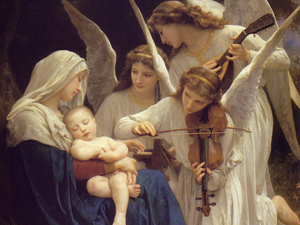 [1]My college training was in radio and television arts. I love the arts, particularly with Christian themes. I came across an excellent production of J.S. Bach’s Mass in B minor (Capella Reial Catalunya, Le Concert des Nations conducted by Jordi Savall). The setting is the French Abbey Church of Saint-Savin Sur Gartempe. Superb location, the performers, camera work, contrasts in lighting, editing, and of course the music is exquisite. A link to the performance is at the end of this post. (It’s 1:46 hours long.)
[1]My college training was in radio and television arts. I love the arts, particularly with Christian themes. I came across an excellent production of J.S. Bach’s Mass in B minor (Capella Reial Catalunya, Le Concert des Nations conducted by Jordi Savall). The setting is the French Abbey Church of Saint-Savin Sur Gartempe. Superb location, the performers, camera work, contrasts in lighting, editing, and of course the music is exquisite. A link to the performance is at the end of this post. (It’s 1:46 hours long.)
Why do I include so much music in my Christian writing? Music can express human emotions where words cannot. Words can capture the meaning of a thought; music captures the feeling of a thought. Together they can capture the essence of a thought or memory. Yet they are not a thought rather an approximation of a thought or a memory or a longing.
That is the sweet heartache of the arts. We are reminded that beauty in its purest form so often lies just beyond reach. Our desire for it intensifies. It is inexpressible. Masters of music, literature and art have come closer to expressing beauty, even if they did not know it. Even if they were in a state of rebellion against God, inklings of the divine image within them can leak from behind the the artist’s spiritual defiance. The Creature is not the Creator but still desires to be creative and create representations of creation.
But even the finest masterpiece, written in a state of spiritual ecstasy, falls short of purest beauty because purest beauty is spiritual. John Keats once said, “Beauty is truth, truth beauty, ‘– that is all Ye know on earth, and all ye need to know.”[1]
“What is truth?”, Pilate asked as he looked into the face of truth.[2] Jesus Christ is the truth.[3] He told us that He is preparing a place for those who trust in Him and He is coming back for us. If it were not so, Christ would not have told us. He wants us in heaven with him.[4] Christ’s followers will know true beauty of everything in Him. Until then, we will have to settle with lesser representations and inklings of the divine. The desire is unquenchable.
At the root of humanity is a desire for heaven; we cannot express this desire because heaven is beyond our earthly experience. C.S. Lewis said, “Now, if we are made for heaven, the desire for our proper place will be already with us, but not yet attached to the true object.”[5] We are made for heaven and I believe that’s what often moves us create and be creative.
_____________________________________
[1]John Keats from “Ode on a Grecian Urn”.
[2] John 18.38.
[3] John 1.14, 14.6, John 18.37.
[4] John 14.1-3.
[5] C.S. Lewis, The Weight of Glory.